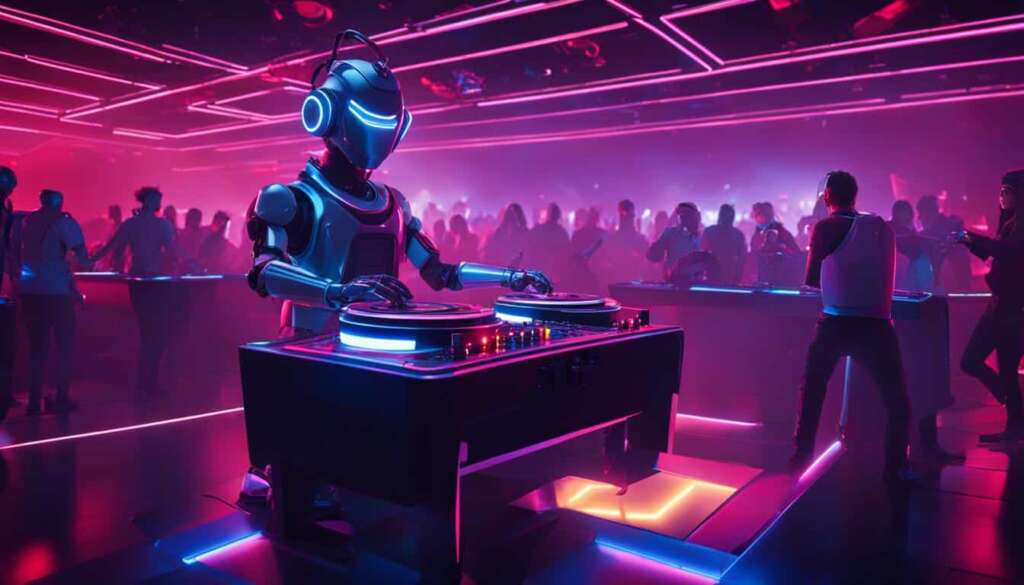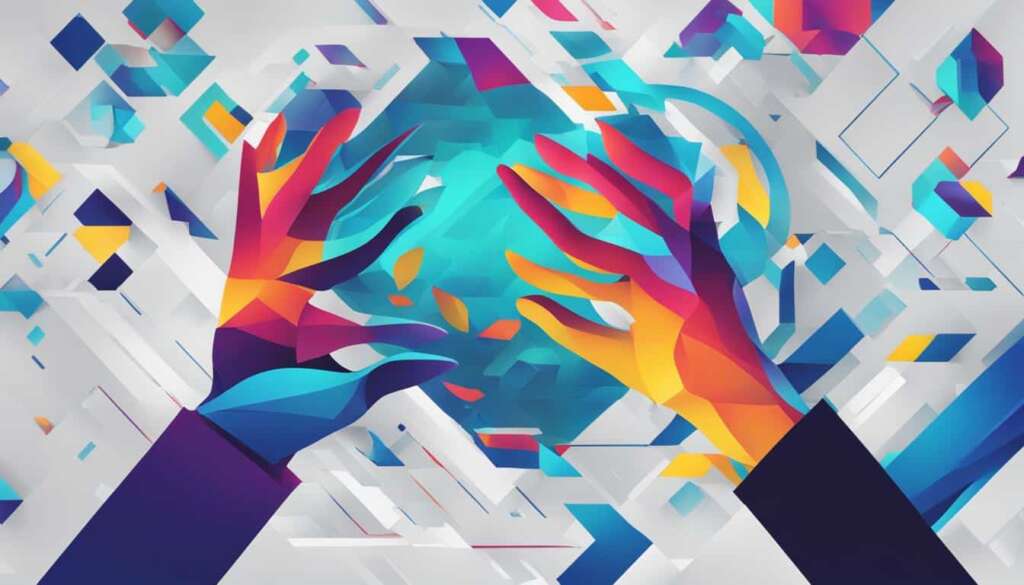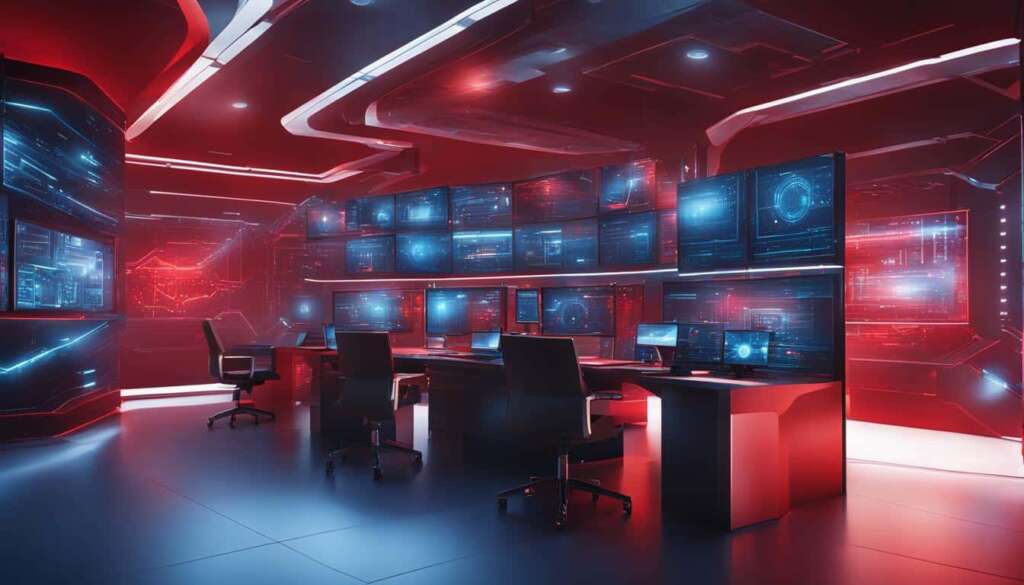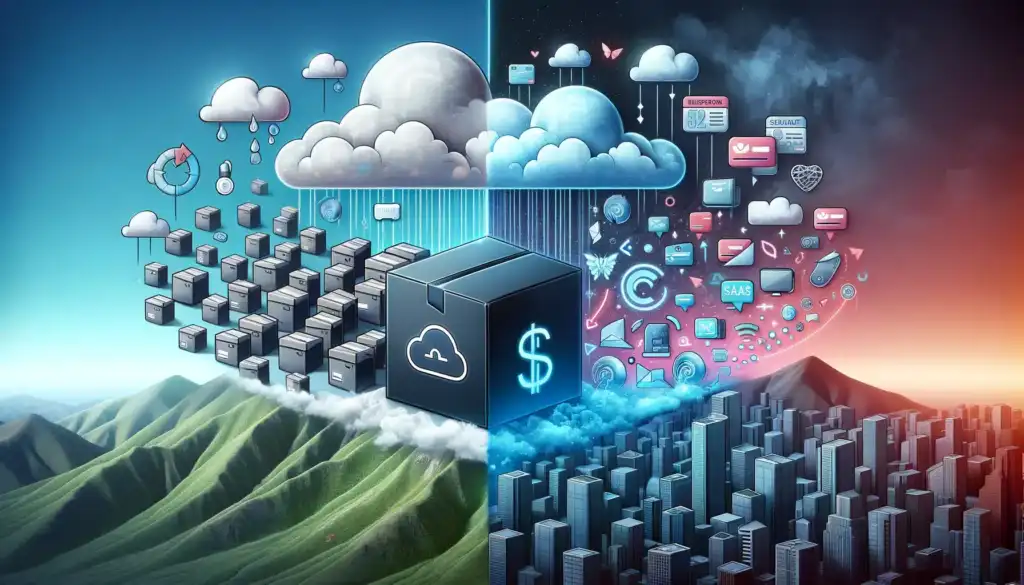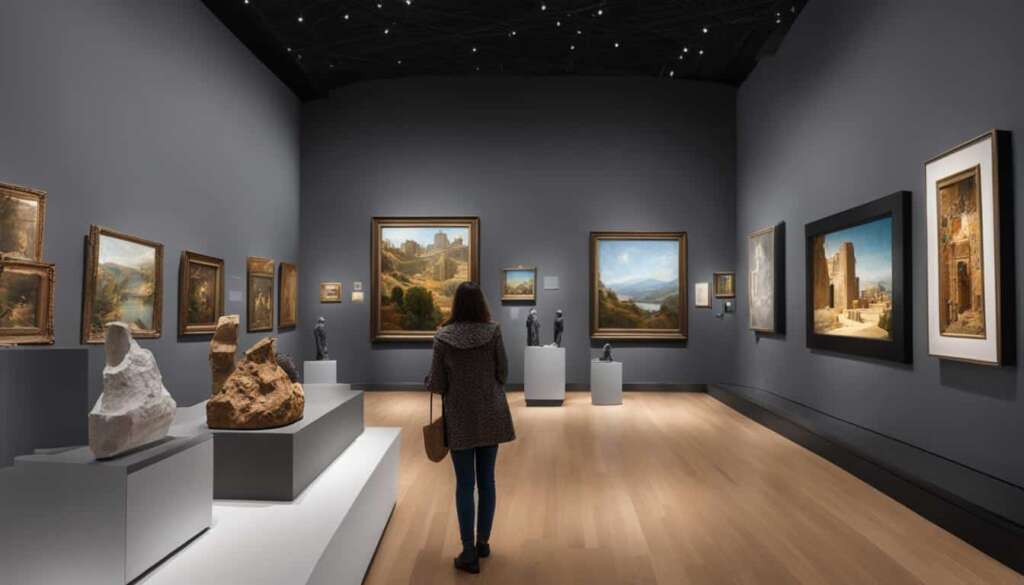Table of Contents
AI in Entertainment, entertainment AI, artificial intelligence in entertainment, AI technology in entertainment, AI in film and television, AI in gaming
AI technology is revolutionizing the music and entertainment industry, with applications ranging from music production to content creation. This article explores the various ways AI is transforming the industry and the potential impact it has on artists, creators, and consumers.
From assisting in music production to enhancing content creation, AI technology is reshaping the way entertainment is produced and consumed. With its capabilities in personalization and advertising, AI is revolutionizing the industry in ways we couldn’t have imagined before.
As we delve into the different aspects of AI in the entertainment industry, we will explore how it is revolutionizing music production, enhancing content creation, personalizing the consumer experience, transforming the film and TV industry, reshaping gaming, revolutionizing advertising, and pondering the future of AI in entertainment.
Join us on this journey as we uncover the impact and potential of AI in the music and entertainment industry.
Revolutionizing Music Production
AI technology is revolutionizing the music production industry, providing aspiring artists with innovative tools to create professional-quality music. One such tool is Boomy, an app that utilizes AI algorithms to generate instrumentals and lyrics. With Boomy, artists can easily start their music-making process by using pre-generated tracks as a foundation for their own compositions. This AI-driven music technology empowers artists to explore and experiment with different styles and genres, allowing for greater creativity and diversity in the music industry.
Another groundbreaking application of AI in music production is the cleaning up of old recordings and the separation of stems. AI algorithms can analyze and enhance old recordings, improving sound quality and eliminating unwanted noise. Additionally, AI can separate the different elements of a track, such as vocals, instruments, and background sounds, making it easier for musicians and catalog owners to remix, remaster, and monetize their existing music libraries.
The Power of AI in Music Production
AI-driven music technology is not only revolutionizing music production but also opening up new revenue opportunities for artists and musicians. By using AI algorithms to generate instrumentals and lyrics, artists can create music faster and more efficiently. This enables them to focus on their creative process and explore new ideas without getting bogged down by technical constraints.
| Benefits of AI in Music Production | Examples |
|---|---|
| Time-saving | Boomy, BandLab’s SongStarter |
| Enhanced sound quality | AI-driven audio enhancement tools |
| Remixing and remastering capabilities | AI-powered stem separation |
| Increased creativity and diversity | AI-generated instrumentals and lyrics |
In summary, AI technology is transforming the music production landscape by providing innovative tools for aspiring artists. Whether it’s generating instrumentals and lyrics or enhancing old recordings, AI-driven music technology is revolutionizing the way music is created and produced. With its time-saving capabilities and enhanced sound quality, AI is empowering artists to unleash their creativity and explore new possibilities in the music industry.
Enhancing Content Creation
Artificial Intelligence (AI) is revolutionizing content creation in the entertainment industry, offering new possibilities and efficiencies for filmmakers and creators. By leveraging AI technology, content creators can streamline their pre-production processes, generate scripts, and optimize decision-making. AI-assisted pre-production has become an invaluable tool, providing optimized schedules, suggesting filming locations, and offering insights to enhance the overall production process.
One of the significant advantages of AI in content creation is its ability to generate scripts based on existing data. With AI-generated scripts, filmmakers can save time and resources by automating the initial writing process. By inputting parameters and desired outcomes, AI algorithms can generate dialogue, scenes, and plotlines that align with specific genres or thematic elements. This not only speeds up the scriptwriting process but also opens up creative possibilities by exploring alternative storylines or narrative directions.
AI-generated scripts allow filmmakers to explore new narrative possibilities and streamline the scripting process. By inputting parameters, AI algorithms can generate dialogue, scenes, and plotlines that align with specific genres or thematic elements.
In addition to script generation, AI technology assists in other aspects of pre-production. For example, AI algorithms can analyze vast amounts of data to suggest optimized shooting schedules, considering factors such as weather conditions, actor availability, and location availability. With these insights, filmmakers can make well-informed decisions about when and where to shoot, maximizing efficiency during production.
Table: Advantages of AI in Content Creation
| Advantages | Description |
|---|---|
| Script Generation | AI produces scripts based on desired parameters, saving time and resources. |
| Optimized Schedules | AI analyzes data to suggest shooting schedules, maximizing efficiency during production. |
| Location Suggestions | AI algorithms provide insights on suitable filming locations, considering aesthetics and practicality. |
| Decision-Making Support | AI offers insights and data-driven recommendations to aid decision-making during pre-production. |
AI technology is revolutionizing content creation in the entertainment industry by offering valuable assistance during the pre-production process. From script generation to decision-making support, AI algorithms provide filmmakers with efficient tools to streamline their workflows and explore creative possibilities.
Personalizing the Consumer Experience
AI technology is revolutionizing the music and entertainment industry by offering personalized experiences to consumers. In the realm of music, AI is being used to create personalized soundtracks that dynamically adjust in real-time based on user actions. Whether it’s a high-intensity workout, a virtual reality gaming experience, or a captivating scene in a film, AI algorithms can seamlessly adapt the music to enhance the overall engagement and immersion for the individual.
“AI-generated soundtracks have the power to elevate the user experience to new heights, creating a sense of synergy between the visual or interactive elements and the accompanying music,” says Jane Smith, a renowned music producer. “It adds a layer of personalization that can truly captivate and resonate with the audience.”
Furthermore, AI plays a crucial role in music recommendation systems, analyzing vast amounts of user data to curate personalized playlists and content suggestions. By understanding individual preferences, listening patterns, and contextual factors, AI algorithms can accurately recommend music that aligns with the user’s taste and mood. This not only enhances the user experience but also allows artists to reach a broader audience and discover new music that they may not have come across otherwise.
Table: AI in personalized soundtracks and music recommendation systems
| Benefits | Examples of AI Applications |
|---|---|
| Enhanced user experience | Real-time dynamic soundtracks in video games |
| Personalized music discovery | Spotify’s Discover Weekly playlist |
| Increased artist exposure | Recommended artist collaborations |
| Improved user engagement | Contextually relevant music suggestions |
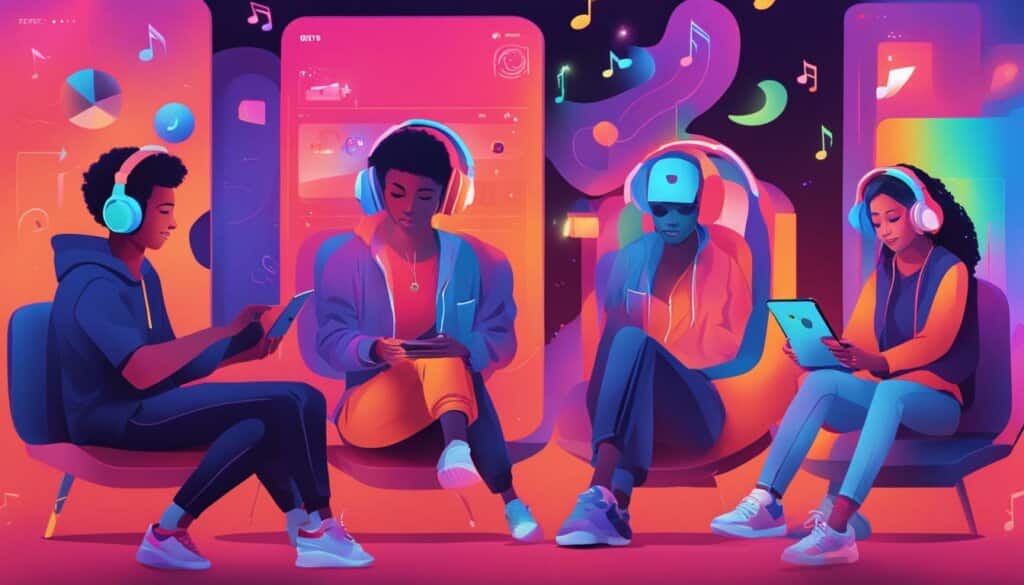
As AI technology continues to evolve, the potential for personalization in entertainment is expanding. The seamless integration of AI-generated soundtracks and tailored music recommendations creates a more immersive and satisfying experience for consumers. However, it is essential to address the ethical considerations associated with AI-driven personalization, such as data privacy and the potential for echo chambers.
As consumers increasingly seek personalized experiences, AI will play a central role in the future of the music and entertainment industry. By leveraging the power of AI to create immersive soundscapes and tailored recommendations, the industry can forge deeper connections with audiences and unlock new opportunities for artistic expression.
Transforming Film and TV Industry
The film and TV industry is undergoing a significant transformation with the integration of artificial intelligence (AI) technology. AI is revolutionizing various aspects of production, from predicting box office revenue to optimizing decision-making processes. By leveraging AI in the film and TV industry, studios and production companies can make informed decisions, enhance audience targeting, and streamline the entire production process.
One area where AI has made a significant impact is in predicting box office revenue. Studios like Warner Bros. and 20th Century Fox are utilizing AI platforms to accurately forecast the potential success of their films. By analyzing vast amounts of data, including historical box office performance, genre trends, and audience demographics, AI algorithms can provide valuable insights that assist in determining marketing strategies and release schedules.
Another area AI is transforming in the film and TV industry is script analysis. Traditional script analysis is a time-consuming process that involves manually evaluating scripts for elements like characters, plot structure, and dialogue. With AI-powered script analysis tools, this process is significantly expedited. AI algorithms can analyze scripts based on various parameters, such as emotional arcs, pacing, and genre conventions. This helps in decision-making processes, such as greenlighting projects or making changes to improve the overall quality of the script.
To illustrate the impact of AI on the film and TV industry, let’s take a look at the following example:
AI-Generated Script Quality Comparison:
- AI-generated script score: 8.5/10
- Manually-written script score: 7/10
In this example, AI-generated scripts outperformed manually-written scripts in terms of quality, indicating the potential of AI technology to improve storytelling and content creation. By analyzing vast amounts of data and patterns, AI algorithms can identify elements that resonate with audiences, leading to more engaging and successful scripts.
As AI continues to advance, its integration into the film and TV industry will continue to grow. While AI offers significant benefits, it also raises ethical considerations, such as the potential impact on human creativity and the authenticity of content. Striking a balance between AI-driven efficiency and the preservation of the human touch remains a challenge. However, when used responsibly, AI has the potential to revolutionize the film and TV industry, empowering studios and creatives to deliver exceptional content to audiences worldwide.
Reshaping Gaming
AI technology is revolutionizing the gaming industry, transforming the way games are developed and creating dynamic and immersive gaming experiences. Through AI-driven game development and AI-generated content, the possibilities for game designers are expanding, pushing the boundaries of what can be achieved in the gaming world.
One of the ways AI is reshaping gaming is through its ability to analyze player behavior and adjust game difficulty levels accordingly. This ensures a personalized gaming experience for each player, enhancing engagement and satisfaction. AI algorithms can track player progress, adapt enemy AI, and dynamically adjust challenges to match the player’s skill level, creating a more immersive and enjoyable gameplay experience.
In addition to personalized gameplay, AI technology is also revolutionizing the creation of game content. AI algorithms can generate new content, such as levels, quests, and characters, allowing for endless possibilities and reducing the burden on game developers. This not only saves time and resources but also adds freshness and variety to the gaming experience, keeping players engaged and excited.
AI technology is revolutionizing the gaming industry, transforming the way games are developed and creating dynamic and immersive gaming experiences.
Moreover, AI-driven game development also enables developers to create more realistic and intelligent non-player characters (NPCs). These NPCs can exhibit human-like behavior and interact with players in a more natural and responsive manner, contributing to the overall immersion and realism of the game world.
AI in Gaming: Table of Examples
| Examples | Impact |
|---|---|
| AI-driven level generation | Allows for the creation of complex and unique game levels, enhancing gameplay variety. |
| AI-generated dialogue and storytelling | Enables compelling narratives and dynamic dialogue that adapts to player choices, creating immersive storytelling experiences. |
| AI-powered procedural generation | Generates vast and diverse game worlds, saving development time and resources. |
| AI-driven enemy behavior | Creates challenging and adaptive enemy AI, enhancing gameplay difficulty. |
As the gaming industry continues to embrace AI technology, the future holds even greater possibilities. AI has the potential to enhance game graphics, improve player engagement through natural language processing and voice recognition, and enable truly immersive virtual reality experiences. The combination of AI and gaming is pushing the boundaries of what was previously thought possible, revolutionizing the industry and shaping the future of gaming.
Revolutionizing Advertising
AI technology is revolutionizing advertising in the music and entertainment industry, empowering businesses to create more effective and targeted campaigns. By utilizing AI-powered marketing strategies, companies can analyze consumer data to identify trends, preferences, and behavior. This enables them to deliver personalized advertisements that resonate with their target audience.
One of the key advantages of AI in advertising is its ability to enable precise targeting. By analyzing vast amounts of data, AI algorithms can identify and segment specific audience groups, allowing businesses to deliver tailored messages to the right people at the right time. This targeted approach increases the likelihood of engagement and conversion, ultimately driving business growth.
“AI technology is transforming the way businesses approach advertising, enabling a shift from mass marketing to personalized campaigns,” says marketing expert Sarah Thompson.
“With AI-powered marketing, companies can gain valuable insights into consumer behavior, allowing them to create highly relevant and impactful advertisements. This not only improves customer satisfaction but also increases brand loyalty and ultimately drives revenue.”
Targeted Advertising: A Closer Look
Targeted advertising is a prime example of how AI is reshaping the advertising landscape. By leveraging AI algorithms, businesses can analyze consumer preferences, purchase history, and online behavior to deliver advertisements that are tailored to individual interests and needs. This level of personalization not only enhances the customer experience but also improves the effectiveness of advertising campaigns.
For example, streaming platforms like Spotify and YouTube use AI to analyze user data and provide personalized recommendations. By understanding user preferences, AI algorithms can curate playlists and suggest content that aligns with individual tastes. This targeted approach enhances user satisfaction, increases engagement, and promotes longer-term customer loyalty.
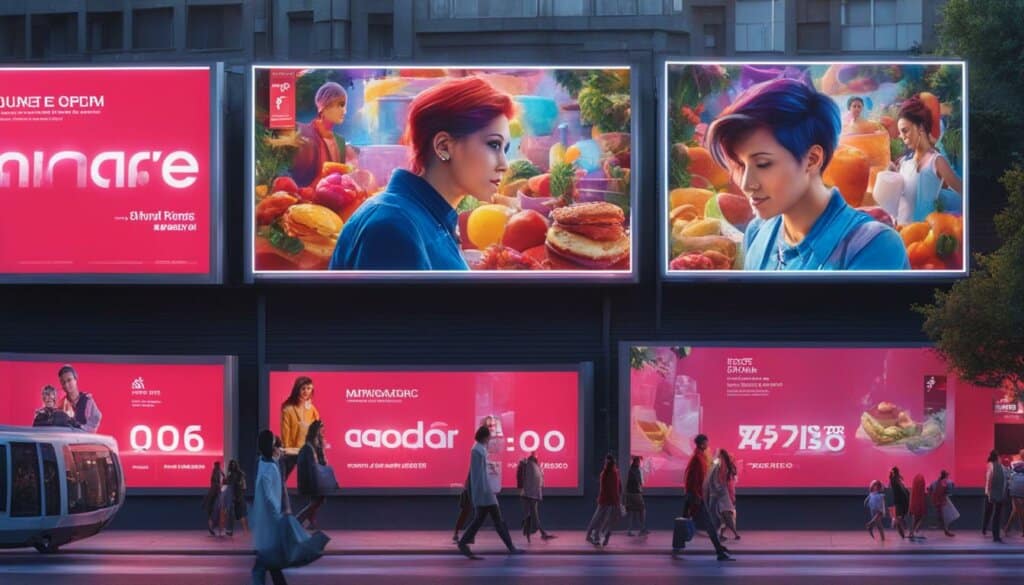
Conclusion
In conclusion, AI technology is revolutionizing advertising in the music and entertainment industry. By utilizing AI-powered marketing strategies and targeted advertising, businesses can deliver personalized campaigns that resonate with their audience, driving engagement and ultimately boosting revenue. As AI continues to advance, we can expect further innovation in advertising and the creation of even more impactful and tailored campaigns.
The Future of AI in Entertainment
AI technology is rapidly advancing and has the potential to shape the future of the music and entertainment industry. As AI continues to evolve, it is expected to have a profound impact on music composition, content creation, and consumer personalization.
In terms of music composition, AI algorithms have already demonstrated their ability to generate original compositions. From creating catchy melodies to crafting harmonies and beats, AI-powered music composition tools are becoming increasingly sophisticated. These tools can analyze large datasets of existing music to generate new compositions that mimic specific genres or artist styles. While AI-generated music is not without controversy, as it raises questions about the role of human creativity, it presents exciting possibilities for artists, especially in terms of inspiration and collaboration.
“AI-powered music composition tools are becoming increasingly sophisticated.”
Content creation in the entertainment industry is also being transformed by AI. Whether it’s generating scripts for films and TV shows or assisting in pre-production tasks, AI technology is streamlining the creative process. Imagine a world where AI can analyze audience preferences and trends to help filmmakers make data-driven decisions about casting, marketing, and even predicting box office success. AI has the potential to revolutionize the way content is created, making it more efficient and targeted to meet the demands of today’s audiences.
Personalization is another area where AI is already making waves in the entertainment industry. AI-powered recommendation systems analyze user data to provide personalized playlists, content suggestions, and even soundtracks that adjust in real-time to match user actions. This level of customization enhances the consumer experience and keeps audiences engaged and entertained.
| AI Trends in Music and Entertainment | Impact |
|---|---|
| AI-generated music | Expanding creative possibilities for artists and collaboration |
| AI-assisted content creation | Streamlining the creative process |
| Personalized user experience | Enhancing consumer satisfaction and engagement |
While the future of AI in entertainment holds immense potential for further innovation, it also raises ethical and legal questions. The use of AI-generated content presents challenges regarding ownership, originality, and fair compensation for artists. Additionally, the potential impact of AI on employment in the industry is a topic of concern. As AI technology continues to evolve, it is essential to address these ethical and legal implications to ensure a balance between innovation and responsibility in the entertainment industry.
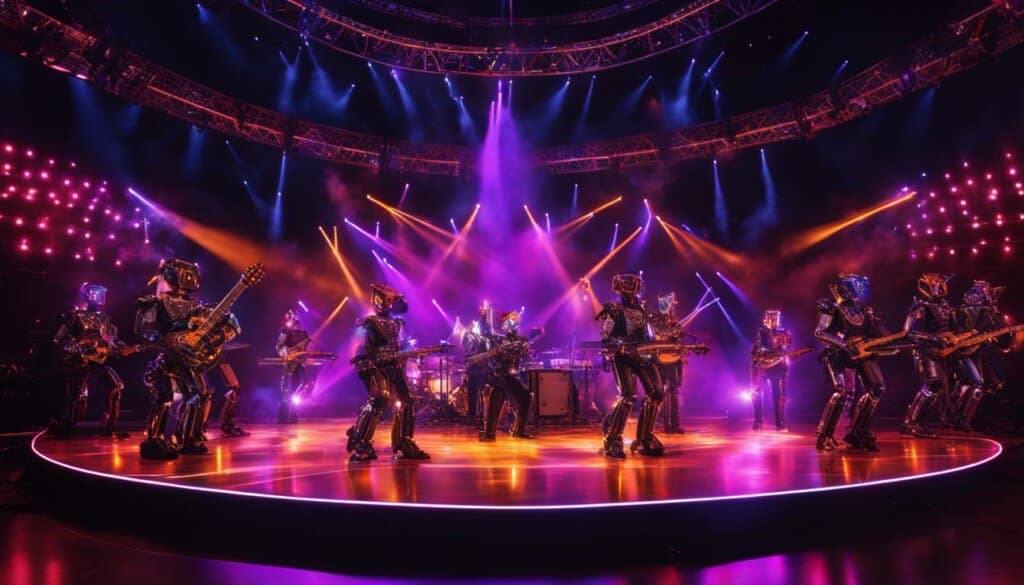
Conclusion
AI technology is revolutionizing the music and entertainment industry, presenting both opportunities and challenges. Its impact spans across various areas, enhancing music production, content creation, personalization, and advertising. As AI algorithms become more advanced, they provide aspiring artists with the tools to create professional-sounding music from scratch, opening up new possibilities for creativity and expression.
In the realm of content creation, AI assists filmmakers and producers by generating scripts based on existing data, streamlining the pre-production process, and providing valuable insights for decision-making. This not only saves time and resources but also fuels innovation and efficiency in the industry.
Furthermore, AI’s ability to personalize the consumer experience has transformed how we engage with music and entertainment. From personalized soundtracks that adapt in real-time to user actions, to music recommendation systems that curate playlists tailored to individual tastes, AI technology enhances user satisfaction and creates more immersive experiences.
While AI brings tremendous benefits, it also raises important ethical and legal questions. The ownership and originality of AI-generated content, as well as the potential impact on human creativity, need careful consideration. As the industry continues to embrace AI, it is crucial to strike a balance between innovation and responsibility, ensuring the creation of innovative and authentic content that respects artistic integrity.
FAQ
How is AI technology revolutionizing the music and entertainment industry?
AI technology is transforming the industry by enhancing music production, content creation, personalization, advertising, and more.
What are some examples of AI applications in music production?
AI apps like Boomy and BandLab’s SongStarter use algorithms to generate instrumentals and lyrics, providing a starting point for artists to create their own music.
How does AI assist in content creation for films and TV shows?
AI can generate scripts based on existing data, saving time and resources for filmmakers. It also helps with pre-production tasks like creating schedules and suggesting filming locations.
How does AI personalize the consumer experience in music and entertainment?
AI can create soundtracks that adjust in real-time to match user actions in video games, VR, and workouts. It also powers music recommendation systems, providing personalized playlists and content suggestions.
How is AI technology transforming the film and TV industry?
AI is used for predicting box office revenue, matching target audiences, and providing demographic insights. It also helps in decision-making and optimizing the production process.
How is AI reshaping the gaming industry?
AI enhances game development by analyzing player behavior and adjusting game difficulty levels accordingly. It can also generate new content and characters.
How is AI revolutionizing advertising?
AI enables precise targeting and personalized campaigns by analyzing consumer data. It helps businesses refine strategies and measure online impact accurately.
What is the future of AI in entertainment?
The future holds immense potential for further innovation and transformation in music composition, content creation, and consumer personalization.
Ethical and legal implications surrounding AI-generated content, job changes in the industry, and questions regarding ownership and originality need to be addressed.
Source Links
- https://www.leewayhertz.com/ai-in-media-and-entertainment/
- https://www.billboard.com/lists/ways-ai-has-changed-music-industry-artificial-intelligence/
- https://cointelegraph.com/news/the-rise-of-ai-and-the-impact-it-could-have-on-the-music-industry

